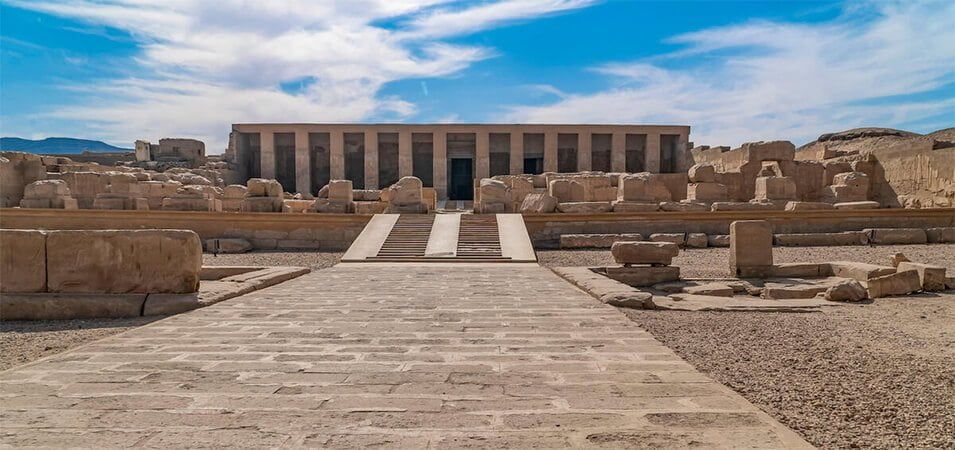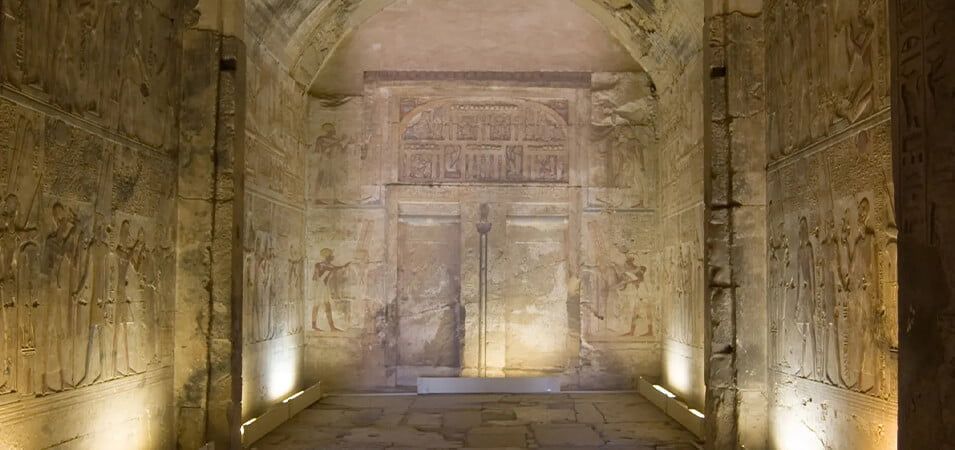Egypt’s Temple of Abydos is an attractive old building with much historical and cultural significance. This temple is in the city of Abydos, which is about 135 kilometers northwest of Luxor. It is where the old Egyptian God Osiris was worshiped. It continues to draw people worldwide because of its long past, beautiful architecture, and religious importance. In this piece, we’ll talk about the temple’s history, architecture, and the intriguing legends associated with it.
Dendera Temple: Unveiling the Ancient Splendor and Mysteries
History of the Temple of Abydos

It has been around since the Predynastic Period in Egypt. Over the years, pharaohs like Seti I and Ramesses II, who ruled during the New Kingdom, added to and changed it. The temple was a significant place of worship where the God of the dead, Osiris, was honored. It was a very important part of Egyptian society, and people came from all over the country to visit it. Over the years, other additions and changes were made to the temple complex, showing how different architectural styles and religious views changed. The Temple of Abydos is very important to history and culture because it shows how smart and holy ancient Egyptian architecture was. It is still a fascinating place for people to visit.
Architecture and Design
It is a great example of how skilled and innovative ancient Egyptian builders were. It has a grand entrance gate, open courtyards, hypostyle rooms, sanctuaries, and chapels, all parts of a traditional temple. The outside walls are covered with detailed carvings of religious scenes and what the pharaohs did. The inside of the temple is just as impressive, with tall columns, artistically decorated ceilings, and well-preserved paintings on the walls. Detail and symbolism in the design show how important the building is from a religious point of view. Ancient Egypt was very good at building things, and the Temple of Abydos is proof of that.
The Main Features of the Temple of Abydos
The Temple of Abydos boasts several noteworthy features that make it a must-visit attraction for history enthusiasts. One of the most renowned aspects is the “King List,” a carved inscription on the temple walls that lists the names of Egyptian pharaohs from the earliest times to the ruling pharaoh’s era. This list provides invaluable insights into the chronology and lineage of the ancient Egyptian dynasties. Additionally, the temple houses the Osireion, a unique underground structure believed to be the burial place of Osiris.
The Mythology of Osiris
In ancient Egyptian religion, Osiris, the main God of the Temple of Abydos, was very important. He was the God of the dead and stood for new life and rebirth. According to a story, Osiris’s jealous brother Seth killed him, but his wife Isis was able to bring him back to life for a while. The story of Osiris’s death and rising became a crucial part of Egyptian funeral ceremonies. It was also closely linked to the annual agricultural cycle, which stood for the endless renewal of life.
Rituals and Worships of the Temple of Abydos
The Temple of Abydos was important to ancient Egypt’s religious customs and rituals. It was where priests and people who believed in Osiris, the God of the afterlife, got together to hold events. Offerings, purifications, reciting holy texts, and processions were all parts of the rituals. The temple was a sacred place where the living could talk to God and ensure the dead had a good trip to the future. The people who did these rituals tried to get blessings, safety, and God’s favor. It was where people went to pray, which was imperative to the old Egyptian religion.
Colossi of Memnon in Luxor: Unveiling the Ancient Marvels
The Importance of the Temple of Abydos
The Temple of Abydos was very important in ancient Egypt, both spiritually and politically. It was considered one of the holiest places dedicated to Osiris, and people came from all over the land to visit it. Because Osiris, the God of the afterlife and rebirth, was linked to the temple, it was a significant place for funeral rites and beliefs. Also, the Temple of Abydos was where royal events took place, like the Sed festival, which reaffirmed the pharaoh’s power and rule. It was also important in Egyptian culture because it was in the middle of the Nile Valley. This made it even more important as a cultural and religious icon.
Legends and Mysteries of the Temple of Abydos
Like many old buildings, the Temple of Abydos is covered in tales and mysteries. Some people think the building has hidden rooms and passages that archaeologists have yet to find. Others believe the temple’s elaborate carvings show advanced astronomical knowledge or hide secret messages. These ideas add a sense of mystery and drama to the temple’s allure, which was already very interesting.
Preservation and Restoration Efforts
Preservation and restoration efforts have been undertaken to safeguard the historical and cultural significance of the Temple of Abydos. With foreign organizations and experts, Egyptian officials have worked hard to ensure the temple’s structure is sound and to protect it from natural decay and damage caused by people. These efforts include keeping the temple’s architecture in good shape, preserving its detailed relief carvings and wall paintings, and stopping erosion and decay. By keeping the Temple of Abydos safe and fixing it up, future generations can enjoy and learn from this fantastic old site for years.
The Temple of Abydos Today

It is a great example of how good the ancient Egyptians were at building and making art. It continues to draw tourists and students because it gives a glimpse into Egypt’s rich history. When people visit the temple complex, they can learn about the ancient Egyptians’ rich history, mythology, and religious customs. This gives them a deep connection to a time long ago.
Exploring the Surroundings
Exploring the surroundings of the Temple of Abydos offers visitors a chance to delve deeper into the rich history and cultural heritage of the region. Abydos is a fascinating city, with archaeological sites and remnants of ancient structures scattered throughout. Nearby, the city of Luxor beckons with its awe-inspiring attractions, including the Karnak Temple Complex, Valley of the Kings, and the Luxor Temple. These sites offer glimpses into the grandeur of ancient Egypt, showcasing magnificent temples, intricate tombs, and captivating artifacts. Visitors can journey through time and immerse themselves in the wonders of ancient Egyptian civilization by venturing beyond the Temple of Abydos.
Kom Ombo Temple: A Fascinating Ancient Egyptian Landmark
FAQs
Can visitors enter the underground Osireion at the Temple of Abydos?
Due to current restoration and preservation work, the underground Osireion is not open to visitors at this time.
Are there guided tours available at the Temple of Abydos?
Yes, guided tours are offered at the Temple of Abydos so that tourists can learn more about the history and importance of the temple.
Is photography allowed inside the temple complex?
Most parts of the Temple of Abydos let you take pictures, but you might need help to use a flash in some places to protect the fragile wall paintings.
Are there any nearby attractions worth visiting along with the Temple of Abydos?
The Karnak Temple Complex, Valley of the Kings, and the Luxor Temple are just a few of the historical sites in the nearby city of Luxor.
Can I visit the Temple of Abydos as part of a day trip from Luxor?
You can take a day trip from Luxor to see the Temple of Abydos. Many tour companies offer guided trips, including getting to and from the temple.
Conclusion
The Temple of Abydos in Egypt is a beautiful reminder of how bright and dedicated the ancient Egyptians were. Its historical importance, beautiful architecture, and connection to Osiris make it a place anyone interested in ancient cultures and mythology must see. The temple’s long history and the legends and secrets surrounding it make it one of the most fascinating places in the middle of Egypt.
